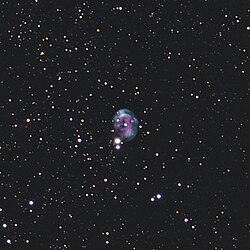NGC 7008
| Emission nebula | |
|---|---|
| Planetary nebula | |
 NGC 7008, the Fetus Nebula | |
| Observation data: J2000 epoch | |
| Right ascension | 21h 00m 32.503s[1] |
| Declination | +54° 32′ 36.18″[1] |
| Distance | 2,800[2] ly |
| Apparent magnitude (V) | 12.0 [3][4] |
| Apparent dimensions (V) | 1.4'x1.1' |
| Constellation | Cygnus |
| Physical characteristics | |
| Radius | ≈ 0.5 ly[2] ly |
| Absolute magnitude (V) | 12.0 |
| Designations | NGC 7008,[1] Fetus Nebula[1] PK 93+5.2[1] |
NGC 7008 (PK 93+5.2), also known as the Fetus Nebula, is a planetary nebula with a diameter of approximately 1 light-year[2] located at a distance of 2800 light years[2] in northern Cygnus. It was discovered by William Herschel in 1787, in Slough, England. NGC 7008 (H I-192) is included in the Astronomical League's Herschel 400 observing program.NGC 7008 is that its intricate and delicate structures make it a fascinating target for both amateur and professional astronomers studying the late stages of stellar evolution and the formation of planetary nebulae.
References
- ^ a b c d e "SIMBAD Astronomical Database". Results for NGC 7008. Retrieved 2009-05-22.
- ^ a b c d Nemiroff, Robert; Bonnell, Jerry. "NGC 7008: The Fetus Nebula". Astronomy Picture of the Day. Archived from the original on 7 July 2015. Retrieved 30 June 2015.
- ^ "NGC 7008". Telescopius. Deep Sky Objects Browser. Archived from the original on 2015-12-29. Retrieved 2013-05-27.
- ^ "Revised NGC Data for NGC 7008". spider.seds.org. Retrieved 2023-06-18.
External links
 Media related to NGC 7008 at Wikimedia Commons
Media related to NGC 7008 at Wikimedia Commons- The Fetus Nebula on WikiSky: DSS2, SDSS, GALEX, IRAS, Hydrogen α, X-Ray, Astrophoto, Sky Map, Articles and images
- Cosmic Mystery: NGC 7008 by Dietmar Hager
- NGC 7008 @ DeepSkyPedia
- Astronomy Picture of the day
